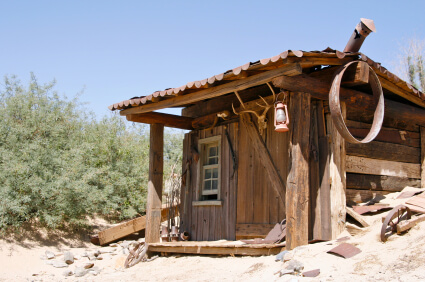An old man lived on his own, deep in the mountains of Colorado. When he died, some relatives came from the city to collect his valuables. Upon arriving, all they saw was an old shack. Inside it was just some old junk, like an old cooking pot, some mining equipment, a cracked table and a three legged chair.
They picked up some of the old relics and started to leave. Then an old friend of the deceased asked “Do you mind if I help myself to what’s left in my friend’s cabin?” “Go right ahead,” the others replied. After all, they thought, what inside that shack could be worth anything?
The old friend entered the shack and walked directly over to the table. He reached under it and lifted one of the floor boards. He then took out all the gold his friend had discovered over the past 53 years – enough to have built a palace. The recluse died with only his friend knowing his true worth. As the friend looked out of the little window and watched the cloud of dust behind the relatives’ car disappear, he said, “They should have got to know him better!”
 I sometimes wonder if we as Christians always realize the treasure which our Lord secured for us. Most will have sympathy for Him who suffered and died a criminal’s death 2000 years ago. But could we too have missed out on the gold? Do we know our Friend’s (Jesus’) true worth?
I sometimes wonder if we as Christians always realize the treasure which our Lord secured for us. Most will have sympathy for Him who suffered and died a criminal’s death 2000 years ago. But could we too have missed out on the gold? Do we know our Friend’s (Jesus’) true worth?
Do we treat Him as if he’s some old relic of history that lived somewhere in strife-torn Middle East long, long time ago in what might as well be another galaxy? What’s that got to do with me? Can we say that we have found the gold, or have we missed it? Will someone one day say of us that we should have got to know Jesus better?
Michael David Rosenberg, better known by his stage name Passenger, is an English folk rock singer, songwriter and musician. Last year he scored a hit with “Let her go”. And although after a while you may get a little tired of the repetition in this song, there is actually some wisdom in it. He says: you only need the light when it’s burning low, you miss the sun when it starts to snow. It’s about a love that should not have ended. It’s about regrets.
Now, let’s face it, our whole life is one big adventure. It is inevitable that we sometimes have regrets. About things that we have lost, things we should have done or things we should have avoided. But what I hope is that this will not make us blind for what we have today. And especially not for the love that God gave us in Christ, and for the path that Christ has shown.
The Israelites had regrets about leaving Egypt. They were slaves in Egypt, but at least there was food. Being set free always involves insecurity, some degree of sacrifice, but the reward is greater. Some Christian leaders will claim that Christianity is not about activism, but I am not so sure. The Egyptians were not going to let the Hebrew slaves go just like that. And when diplomacy fails and abuse continues, you sometimes have to act. The story of the Exodus shows that God is not a God of the establishment, but of those who suffer injustice. But in those days, and dare I say, much like today, many didn’t even realize they were enslaved. They enjoyed a certain basic comfort, and did not want to lose what little they had.
The whole congregation was complaining against Moses and Aaron in the wilderness. And you know what, God understood! Although this was also a complaint against God, the people were not ignored or punished. You see, our God is not a god who doesn’t care. Not one who only wants to be obeyed. God is primarily, yes, totally a God of love. Jesus came to live among us to reveal that love.
That’s not to say that in the time before Christ God was any different. It was just that the divine love was less understood. As we can tell for instance from these very complaints from the Israelites. But the Mosaic text mentions not once, but three times that God has heard the complaints of the people. In Psalm 103 it says: “For He knows what we are made of, remembering that we are dust”. So God knows we have physical needs as well as spiritual ones. And God provided for them. It was not quite what they expected, but God was there with them, in spite of their lack of trust.
How come, by the way, that we so often trust those who cannot be trusted, and not the Holy Spirit. When political leaders and institutions present hatred and greed as sound government, we believe them. When someone preaches solidarity and reconciliation, he or she is considered naïve and suicidal.
Now I must admit that seeing what is wrong with this world and saying ‘no’ to it, is not enough. It is true that this kind of activism will not do. Our readings of today make it clear that two additional things are very important: to have a vision for a better world and to have good leadership. The Israelites had Moses, but at first they found it quite difficult to imagine a better world. From scratch they had to build a whole new society, with just laws, with fair government, etc. And this would prove very difficult, even to this very day (if we can compare the present state of Israel to the theocracy it set out to be). But at least the people of Israel started out on this adventure with God.
And how are things for us today, as Christians? Are we still convinced there is no alternative for a society that as a whole accepts exploitation as long as profits increase? In which whole countries and ethnic groups are written off or presented as the enemy, and not because they threaten our freedom, but because they value their own autonomy or culture? Of course there are alternatives. But we need the courage to be open-minded, and we need leaders to do the same and to develop a vision of peace. And guess what? Jesus was that kind of leader. He refused to believe that another kind of society or at least another attitude was impossible. And he proclaimed in many different ways that such a kingdom of God had already started.
Often we hear the argument that society will never be perfect and that perfection is not the aim of Christianity, but forgiveness and salvation. But now it is time to ask the big question: What do we mean by salvation? What is the gold that Jesus left for us? Is it limited to forgiveness for our sins?
Here I need to point out that forgiveness already existed in the Old Testament. People could just kill an animal and have their sins forgiven. Today that has fortunately been replaced by confession and absolution. But what is the real treasure? It may well be that we need time to discover for ourselves all the aspects of God’s love as revealed by Christ. Not all Christians will have all the answers ready, and if they do, they are probably not to be trusted. We need to remain open for what the Holy Spirit has to tell us in the course of our life.
But there are a few things I know:
- We need to be prepared to change. There is no point in praying for the Holy Spirit, receiving and answer and then not making the changes the Spirit requires.
- Jesus was considered a revolutionary. Are we then to be satisfied with the status quo? Well, no!
- In the letter to the Ephesians it says that Christ made captivity itself a captive and that he gave gifts to the people. This is another way of saying that salvation has to do with freedom and that He gave us the means to develop that freedom without ignoring our responsibilities.
Then all the gifts of the Spirit are mentioned. They are definitely part of “the gold”.
I think that perhaps we have regarded the gifts of the Spirit too much as something for the church only. Of course the gifts that are mentioned are first and foremost meant “to equip us for the work of ministry, for building up the body of Christ”. The aim is “unity of the faith”, knowledge and maturity.
But this is something God wants for the whole world. And therefore each gift is something we sorely need in ordinary society as well: knowledge, service, care for each other, dialogue and discernment. These gifts can help us not only to distinguish between true and false doctrine, but also between truth and falsehood in general, in all areas of life. “We must no longer be children, tossed to and fro and blown about … by people’s trickery, by their craftiness in deceitful scheming”. To those arguing that the gifts of the spirit are only meant for the church, we could also reply that the church is more than those who meet together on Sunday. The Greek word for church, ecclesia, not only means “meeting”, but also “those who are called out of something”, in this case out of the world. Whether people listen to that call, or even understand it, is another matter, but they are called, and when that happens the gifts of the spirit already play a part. It is actually quite an important part of the Spirit’s and of our ministry.
As I said, the gifts of the Spirit can help us to distinguish truth from falsehood. One of the greatest misconceptions is still that everything should revolve around food and money and status and material possessions. The people who came to Jesus pointed to Moses as the one who fed Israel. Not only was this incorrect, because God performed the miracle and not Moses, but they also repeated the mistake of the Israelites.
Apparently it is difficult to see the true significance of such miracles. They are not about who can supply the most and the best food, they are about God’s assurance that there will be enough for everyone, if we share. And also about making the fruits of the Spirit part of our “diet”. They are, believe it or not, more important for our survival than the food that perishes. These gifts are like a treasure that deserves to be studied, used and valued more than they generally are.
The bread of heaven is not just meant for the inner circle. Jesus says it “is that which comes down from heaven and gives life to the world.” Just as Jesus was needed to create and reveal and send these treasures, so we are needed to become familiar with them, to gratefully accept them, to be transformed by them, to apply them in our service to the world, and to teach others how to use them.
We can safely leave behind us the false promises of most of our politicians and marketeers. But we cannot afford to lightly dismiss the message and the person of Jesus Christ. May Christ inspire us to, as the Bible calls it, to store up for ourselves “treasures in heaven”. May He also help us to value and apply them for the rest of our lives, to our own benefit, for the welfare of others and to the glory of God.
Amen.





Leave A Comment